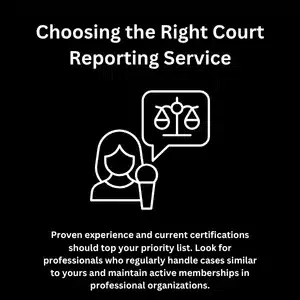
If you’ve ever needed a deposition transcribed or a hearing recorded in Waco, you might have been surprised by how varied court reporter fees can be in the legal system. Why do some services cost more than others—and are they worth it? Many people entering the court system for the first time find themselves asking, “How much does a court reporter cost?” without understanding what factors drive those numbers in this specialized industry.
The confusion is understandable. Court reporting services aren’t like buying groceries where prices are clearly marked on every item. Instead, you’re paying for specialized skills, advanced equipment, and professional certifications that can significantly impact the accuracy and reliability of your legal proceeding. Reporters often complete a rigorous program or course and must stay current with industry standards. Factors like expedited service, other costs, and transcript delivery time can also affect fees.
Understanding these cost factors helps you make informed decisions. If you’re considering a career in court reporting, enrolling in a certified program is essential to meet the demands of this critical program-based profession.

A court reporter plays a vital role in legal proceedings, capturing every word for the official transcript used throughout the court system and courthouse. This accuracy is crucial for appeals and legal strategy, making the work of certified court reporters far more complex than basic transcription services and essential to the legal industry.
Many court reporters hold an associate degree or bachelor’s degree beyond a high school diploma, often completing a formal program or course to gain the skills required. Their real-time transcription allows lawyers to search testimony instantly during a proceeding, making them an indispensable person in the courtroom.
Factors like geographic location, appearance fee, expedited service, and additional services all affect how much a court reporter costs—often billed on a per page basis. Whether working in court or in the freelance market, their expertise supports the entire legal process. For those considering a rewarding career, enrolling in a certified program or course is key to success. This course-based training prepares future reporters to meet the demands of the profession through a well-rounded program.
Live, in-person court reporting remains the preferred choice for legal proceedings. Hiring an official court reporter on-site ensures real-time accuracy, quick clarification during hearings, and professional equipment for capturing every word of the proceeding. Many court reporters bring years of experience, certifications, and specialized education from a court reporting program to this vital role.
Video court reporting adds value by capturing expressions and gestures—important in cases where non-verbal communication matters—though it includes extra costs. Remote court reporting offers flexibility and access to certified reporters outside your location, often lowering travel-related fees and helping businesses move forward without delay. The freelance market for these services has expanded, increasing career opportunities and hiring options.
Transcription services from existing recordings are usually priced on a per page basis and represent the most budget-friendly solution when a court reporter wasn’t present. However, they can’t respond to unclear audio or provide the same accuracy. Specialized software used during live reporting ensures transcripts can be searched quickly or converted into a standard file format. When evaluating how much a court reporter costs, be aware that service type, appearance fees, page rates, and other services vary. For example, some programs offer bundled services that may save money. To obtain quality results, choose a program-trained reporter.

Experience and certifications play a big role in how much a court reporter costs. Certified court reporters with advanced credentials or experience in high-stakes legal hearings typically charge higher fees. A courtroom deputy with decades in the legal field brings expertise that’s often worth the premium, especially if they’ve completed a specialized program and continued their education to maintain top-tier skills.
Geographic location also matters—Waco’s rates often fall between rural and metropolitan Texas pricing. If a court reporter must travel from another city, expect additional costs like mileage, lodging, and an appearance fee. The duration and complexity of your proceeding influence the final cost. Most reporters charge hourly, with minimums, and expedited service can double your transcription services bill. Standard page rates apply, but rush jobs or same-day delivery will often raise the page cost significantly.
Additional services like speaker tags, complex formatting, or same-day transcripts add other costs. Some reporters also charge equipment fees for real-time software or on-screen display features. To avoid unexpected fees, be aware of every potential charge, including page minimums, and request detailed estimates before the court reporting begins. Careful planning—and choosing trained reporters through a quality program—ensures you pay only for the services you truly need, one page at a time.
Hour rates for live court reporting in Waco vary based on experience, certifications, and case complexity. Most court reporters require a two to four hour minimum, covering preparation, travel, and post-proceeding work beyond actual courtroom time. Transcript fees are usually billed on a per page basis, with expedited service costing significantly more. A standard deposition may produce 50–150 pages, offering some predictability in estimating costs and allowing you to search for a cost-effective option.
Video reporting adds to the overall court reporting cost, especially when post-production or specialized equipment is needed. Many reporter agencies offer bundled transcription services and video options for better value. Travel-related costs depend on mileage, parking, and time. Local agencies may waive these fees within a certain location, making them more budget-friendly for everyday proceedings.
These combined fees depend on your specific proceeding and the agency’s pricing model. For example, some professionals who completed a court reporting program with advanced certifications may charge higher fees. Understanding all these factors can help firms and agencies accurately forecast total fees and avoid surprise charges. Choosing a reporter who has completed a reputable program, keeps up with industry changes, and holds multiple certifications ensures accuracy and reliability—qualities developed through a rigorous training program.

Proven experience and current certifications should top your priority list when evaluating court reporters. Look for professionals who regularly handle cases similar to yours and maintain active memberships in professional organizations. Ask potential providers about their experience with your specific type of legal matter, as specialized knowledge can prevent costly errors or delays.
Quality standards become apparent through samples of previous work and client references. Request transcript samples that demonstrate formatting consistency, accuracy, and attention to detail. Many reporters are willing to provide references from local attorneys who can speak to their reliability and professionalism. This research investment pays dividends when you need dependable service under pressure.
Modern technology capabilities separate top-tier reporters from those using outdated methods. Look for providers who use current software, offer real time transcription, and can deliver transcripts in multiple digital formats. The ability to search electronic transcripts and integrate them with case management systems adds significant value to the basic service.
Responsive customer service and transparent pricing indicate a professional operation that values client relationships. Providers should answer questions promptly, explain their fee structure clearly, and accommodate reasonable requests for scheduling changes. Clear communication during the hiring process usually predicts smooth service delivery when your case is underway.
Accuracy in real time sets professional court reporters apart from automated alternatives. While voice recognition software continues improving, it cannot match human judgment in distinguishing speakers, understanding context, or seeking clarification when testimony becomes unclear. The legal process demands precision that only trained professionals consistently deliver.
Nuance and context capture represent areas where human court reporters excel beyond any current technology. These professionals understand when a pause carries meaning, when tone changes significance, and when unclear speech requires immediate clarification. Their ability to read courtroom dynamics and adapt accordingly ensures comprehensive record-keeping that serves the legal system effectively.
Confidentiality and ethical standards provide additional value that justifies professional court reporter fees. Certified reporters bound by professional codes of conduct understand the sensitive nature of legal proceedings and maintain appropriate discretion. This ethical framework protects all parties involved while ensuring compliance with legal requirements for official documentation.
Accountability compared to automated tools gives attorneys and clients confidence in the final product. Professional court reporters stake their careers on accuracy and stand behind their work with professional liability insurance. When questions arise about transcript accuracy, you have a qualified professional who can address concerns and provide necessary corrections.

Understanding what drives court reporter pricing helps you make informed choices that balance cost with quality. The cheapest option rarely proves most economical when accuracy problems create delays, appeals, or other complications. Investing in qualified professionals typically costs less than fixing problems created by inadequate documentation.
Working with experienced court reporters who understand Waco’s legal community often provides additional value beyond basic transcription. These professionals know local procedures, understand regional legal practices, and maintain relationships with courthouse staff that can smooth logistical challenges. Their local knowledge and established reputation often justify slightly higher fees.
Planning ahead and communicating clearly about your needs helps reporters provide accurate estimates and deliver appropriate service levels. Discuss timeline requirements, special formatting needs, and any unique aspects of your case during initial conversations. This planning prevents misunderstandings that could lead to additional costs or service delays.
In Central Texas, including Waco, we’ve worked with a range of court reporting professionals and know how to match the right service to your case’s needs and budget. Our goal is always clarity—so you can focus on your legal matter, not stress over invoices. Understanding court reporter costs helps you make confident decisions that support your legal strategy while managing expenses effectively.
If you’re unsure what kind of court reporting service you need, feel free to reach out. We’re happy to point you in the right direction—even if you don’t end up working with us.
Most services combine an appearance or session minimum with per-page transcript rates, with optional add-ons like rough drafts, daily copy, realtime, or video. Travel, parking, and exhibit handling can appear as separate line items depending on location and logistics.
Experience, certifications, subject-matter complexity, and specialized technology (e.g., realtime feeds) command higher fees. Short-notice scheduling, long durations, and tight delivery deadlines also increase rates.
Ask for an itemized written quote that lists the appearance minimum, expected page count range, turnaround options, travel, video, and any tech or copy fees. Share your schedule, preferred delivery timeline, and formatting needs early to prevent rush surcharges and unnecessary extras.
They are valuable when counsel needs live text for on-the-fly impeachment, same-day strategy, or court deadlines that hinge on immediate transcripts. If timing is flexible and accuracy needs are routine, standard delivery without realtime usually provides the best value.
